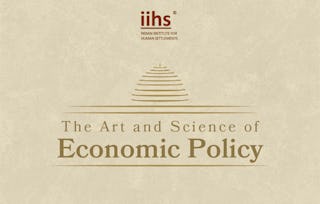Welcome to the Economics of Reforms and Regulation course! By the end of this course, you will understand the economics of reforms and regulation, with a focus on contemporary issues and debates. You will be introduced to the rationale for an economic role of the government viz-a-viz imperfections in the real markets and inform them of some of the dimensions of the debate on state-market dichotomy. You will learn to recognize good regulatory practices by carefully considering regulatory structures across the globe. Instruments of regulation, both economic and social, are investigated using examples and case studies from various sectors. In particular, the course examines reforms in the public procurement and financial sector, and regulatory frameworks in the energy sector and will inform you of the need to revisit antitrust laws in the new-economy industries. You will also be able to peek into regulatory designs that were ground-breaking in their use of behavioral economics, new auction formats, and calls for similar creativity in formulating regulations as the world becomes radically uncertain. Lastly, you will be able to re-examine the role of the state taking cognizance of non-traditional views, specifically those from the field of New Institutional Economics, the idea of a Developmental State, and Mariana Mazzucato’s idea of an entrepreneurial state.

Economics of Reforms and Regulations
Ends soon: Gain next-level skills with Coursera Plus for $199 (regularly $399). Save now.

Recommended experience
What you'll learn
Explain the economic rationale for reforms and regulations in different market settings.
Evaluate the impact of several types of regulatory policies on market outcomes and social welfare.
Examine the effectiveness of the regulatory policies in various contexts.
Recognize the need for unconventional wisdom in assessing the role of the State and its instruments of reforms and regulation.
Skills you'll gain
Details to know

Add to your LinkedIn profile
September 2025
25 assignments
See how employees at top companies are mastering in-demand skills

There are 7 modules in this course
In this module, you will be introduced to a few known fundamentals of welfare economics, delineating efficient outcomes of a “perfectly competitive” market, albeit under strong assumptions. Through a simple market experiment, you will be able to learn that competitive equilibrium is a good predictor of price and quantity even if we assume weaker conditions. This module will answer some of the obvious questions such as why governments intervene in markets, and what are some of the reasonable grounds for governments to intervene in markets. To answer these questions, this module examines real markets that are “imperfect” and therefore unable to produce, consume, or distribute in accordance with what is best for everyone. Lastly, this module characterizes some of the dimensions of the debate on state-market dichotomy, both in the context of free-market advocacy and in the light of historical evidence of government failures across the world. The need for developing a mutually supportive system for market and non-market institutions is emphasized upon.
What's included
10 videos7 readings4 assignments1 plugin
In this module, you will gain an understanding of the regulatory institutions and structures that exist to facilitate the functioning of markets while protecting larger social interests. You will be introduced to the role of economic regulation in promoting competition, consumer protection, and economic efficiency.
What's included
9 videos4 readings3 assignments
This module focuses on the roles and functions of regulatory institutions in ensuring public health, safety, and environmental protection, as well as the legal and policy frameworks that guide their decision-making processes. In this module, you will be introduced to policy assessment tools offered in cost-benefit analysis with more emphasis upon non-market valuations. The module concludes with discussions on some known (and some not so) regulatory instruments that are used to lower environmental pollution.
What's included
9 videos4 readings4 assignments
This module will introduce you to major regulatory policies and reforms in the public finance sector, specifically those undertaken in the banking sector and in public procurement processes. The module stresses upon the need for good quality regulation in the banking sector which is significant to the financial systems and the health of the economy as a whole. You will also be able to learn the workings of public procurement systems and how governments need to prioritize reducing corruption in public purchases of goods and services by implementing efficient and competitive designs.
What's included
8 videos4 readings3 assignments
In this module, you will be introduced to the key reforms and regulations in the energy sector and in new economy industries. Beginning with various policy instruments that are used to regulate the energy sector, the module also discusses the rationale for government intervention in energy and examines power regulations in the UK, following privatization. You will also be introduced to the meaning and importance of the new economy and the need for government regulations to adapt in the context of technological revolutions in data mining and communications.
What's included
8 videos3 readings3 assignments
In this module, you will gain insights into regulatory frameworks that were innovative in their use of techniques and insights from behavioral economics and novel auction formats. The module emphasizes the need for regulators to adopt similarly inventive approaches to regulation as the world becomes radically uncertain.
What's included
7 videos4 readings4 assignments
This module discusses the role of the state through two alternative thought processes that challenge the conventional views offered in mainstream economics. One through the lens of a subdiscipline of economics called “New Institutional Economics” and the other through the lens of “the Entrepreneurial State” as developed by Mariana Mazzucato. In a similar vein, the idea of a developmental state is explored where the state takes a more active role and pursues industrial policies.
What's included
9 videos1 reading4 assignments
Build toward a degree
This course is part of the following degree program(s) offered by O.P. Jindal Global University. If you are admitted and enroll, your completed coursework may count toward your degree learning and your progress can transfer with you.¹
Instructor

Offered by
Explore more from Economics
 Status: Free Trial
Status: Free TrialIE Business School
 Status: Preview
Status: Preview Status: Free
Status: FreeParsons School of Design, The New School
 Status: Preview
Status: PreviewIndian Institute for Human Settlements
Why people choose Coursera for their career





Open new doors with Coursera Plus
Unlimited access to 10,000+ world-class courses, hands-on projects, and job-ready certificate programs - all included in your subscription
Advance your career with an online degree
Earn a degree from world-class universities - 100% online
Join over 3,400 global companies that choose Coursera for Business
Upskill your employees to excel in the digital economy
Frequently asked questions
To access the course materials, assignments and to earn a Certificate, you will need to purchase the Certificate experience when you enroll in a course. You can try a Free Trial instead, or apply for Financial Aid. The course may offer 'Full Course, No Certificate' instead. This option lets you see all course materials, submit required assessments, and get a final grade. This also means that you will not be able to purchase a Certificate experience.
When you purchase a Certificate you get access to all course materials, including graded assignments. Upon completing the course, your electronic Certificate will be added to your Accomplishments page - from there, you can print your Certificate or add it to your LinkedIn profile.
Yes. In select learning programs, you can apply for financial aid or a scholarship if you can’t afford the enrollment fee. If fin aid or scholarship is available for your learning program selection, you’ll find a link to apply on the description page.
More questions
Financial aid available,

